Sustainable, innovative materials: Volkswagen Group's commitment
Seat covers made from plastic bottles, car parts made from rice husks and innovative, environmentally friendly manufacturing processes. When it comes to sustainable vehicle production, Volkswagen Group is creative and innovative.
Volkswagen Group vehicles are becoming more and more sustainable, and not just because of the electric motor. Recycling and upcycling - transforming seemingly useless waste into materials that can be used in industrial processes - are becoming increasingly important for all the Group's brands. “The partnership with SEAQUAL INITIATIVE in designing the seats for the CUPRA Born shows that sustainability, innovation and modern design are a perfect fit” explains Antonino Labate, Director of Strategy, Business Development and Operations at CUPRA.
CUPRA and SEAT: plastic from sea waste and rice husk
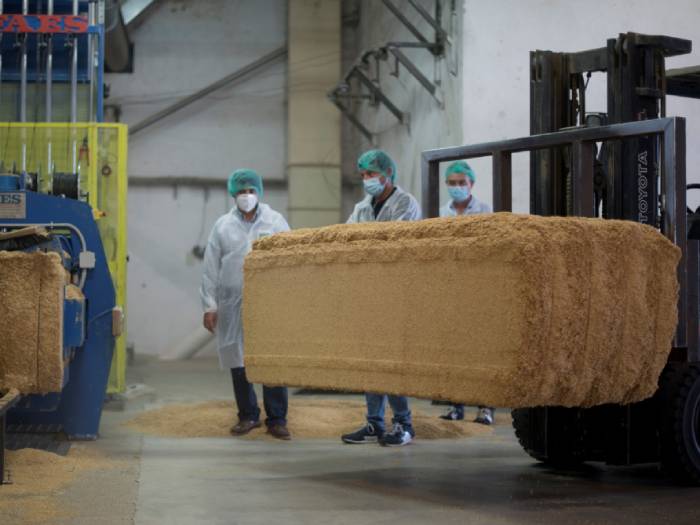
The SEAQUAL YARN used for the seat covers of the CUPRA Born is a material made from recycled polymer fibres obtained from plastic waste collected from the sea, making beaches and water cleaner. SEAT has always been very creative when it comes to using sustainable materials: it has been testing the use of rice husk, a by-product of manufacturing that is usually burned. “It is a 100% plant-based raw material and to recycle it we have developed Oryzite, a material that can be mixed with other thermostable thermoplastic composites” explains Iban Ganduxé, CEO of Oryzite.
SEAT is using this compound to produce car parts previously made from plastic, such as parts of the tailgate, the double loading floor and the roof liner. This will significantly reduce the percentage of plastics and crude-oil-based raw materials in the vehicles. The components are lighter, thus reducing weight, which in turn decreases CO2 emissions.
Audi: seats from recycled plastic bottles
Even the seat covers in the Audi A3 are mostly made from recycled plastic bottles. Broadly speaking, the process starts with the collection of used transparent bottles (which are easier to dye), which are then cleaned by a specialised company, stripped of their caps and cut into tiny flakes in a shredder. This produces the granulate, from which a yarn producer creates polyester fibres, which are then turned into yarn.
Up to 89% of the various textile designs for the Audi A3 comes from recycled materials. 45 bottles with a capacity of 1.5 litres are used for the textile "Torsion", while a further 62 plastic bottles are recycled to make the carpet. And more and more other interior components are being made from secondary raw materials: the insulation panels, the absorbers, the side panel in the boot, the loading floor and the liner mats. The aim is to significantly increase the percentage of recycled materials in the Audi fleet in the coming years, while continuing to provide customers with the high-quality products they are used to.
The e-tron GT project: sustainable covers
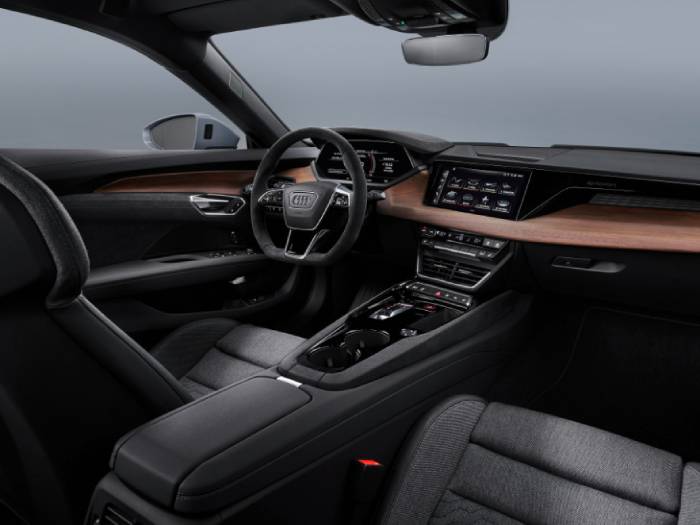
Audi AG has also launched a pilot project - together with Alcoa and the RONAL GROUP - for the 20-inch rims of its all-electric Audi e-tron GT. These rims are made from aluminium produced with reduced CO2 emissions, thanks to an innovative smelting process in which oxygen is released instead of carbon dioxide. As for the seat covers, the offer for the Audi e-tron GT includes solutions made primarily from recycled materials, i.e. with a combination of imitation leather with the Dinamica microfiber material or with the Kaskade textile: both options predominantly consist of materials such as polyester fibers, manufactured from recycled plastic bottles, textiles or residual fibers.
A total of 119 plastic bottles are used for each seat with Kaskade covers. Dinamica also covers the top of the centre console, the door trim and the dashboard. Carpet and floor mats are made from Econyl, a material produced entirely from recycled nylon fibres, made from production waste, fabric scraps, old carpets and old fishing nets.
Porsche: natural fibres in components
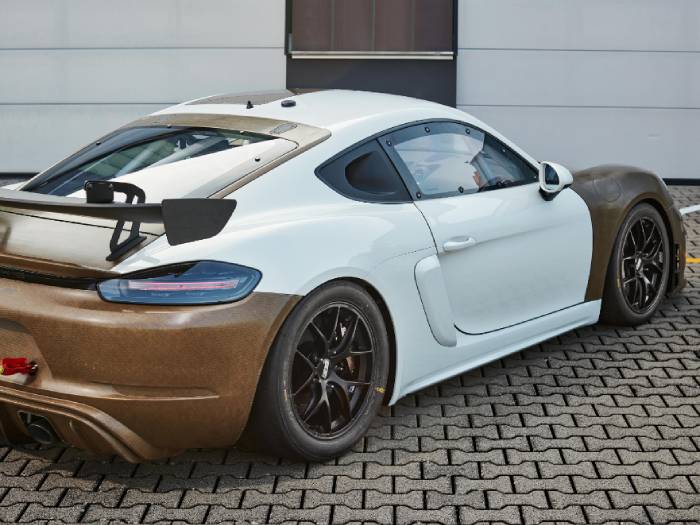
For more than two years, Porsche has been manufacturing both the doors and the rear wing of the Porsche 718 Cayman GT4 Clubsport MR racing car using a mix of natural fibres that is primarily sourced from renewable raw materials. The aim is to extend its use to other components, such as the front and rear apron, front spoiler lip, front and rear lids, mudguards and diffusor, including the aerodynamic fins.
These sustainable organic fibre composites are made from flax fibres, which are produced in agriculture without compromising food cultivation. As for the production models, the Taycan's upholstery “OLEA” is made from leather tanned in a sustainable process using olive leaves.
Volkswagen: wood and organic oil for dashboard and tyres
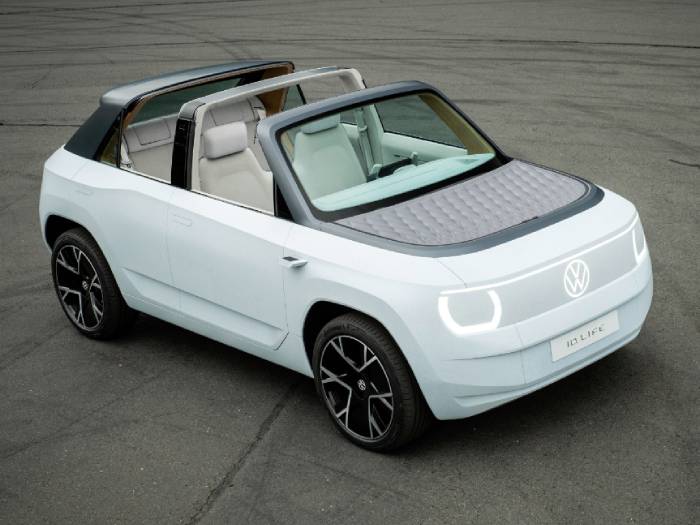
The ID. LIFE concept car shows Volkswagen's vision of the future. Its sustainable nature is not only reflected in the all-electric drive, but also in the selection of materials and paintwork solutions: the clear lacquer for the car body uses wood shavings as a natural colorant and a bio-based hardening agent. The long-term goal is to eliminate paint completely.
On the ID. LIFE, the roof lining and front panel are made entirely from recycled plastic bottles. For the tyres, natural rubber, silica from rice husks and organic oil are used, among other things. The wooden frames in the dashboard and rear seat area are also made from certified raw materials. The ArtVelours Eco used for the seat covers and door trims and textiles for the headrests and door panel is made from recycled PET bottles and used T-shirts. And last but not least, shredded used tyres give the rubber paintwork for the boarding area a very distinctive texture.
ŠKODA: upholstery made of wool and recycled plastic
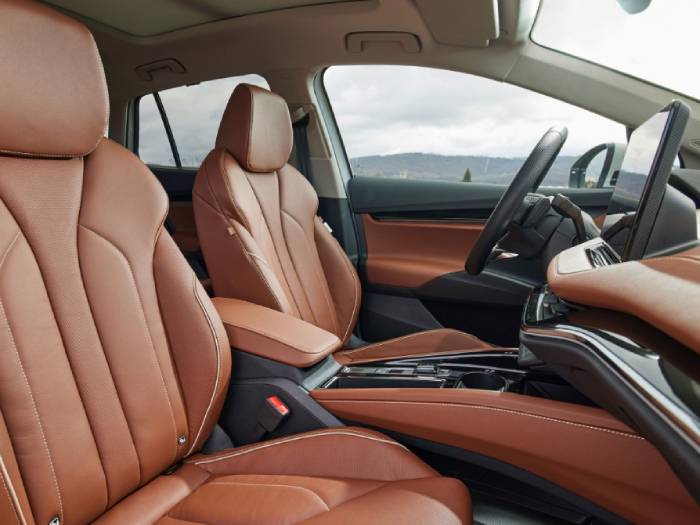
The ŠKODA ENYAQ iV also uses fibres from recycled plastic bottles for foot mats and carpet boot mats, while refurbished materials are used for sound insulation.
Two environmentally friendly seat covers are available. In the Lodge Design Selection, 40% of the covers is made from natural virgin wool and the covers have been awarded the Woolmark Wool Blend Performance by the Woolmark Company, which is assigned to products containing between 30% and 49.9% virgin wool. The other 60% is made from recycled plastic bottles; the ecoSuite Design Selection also offers sustainable seat covers: the cognac-coloured leather, for example, is produced without using chromium-sulphate-based chemicals. Instead – like at Porsche - an extract from the leaves of the olive tree is used for the tanning process.
Source: Volkswagen AG
VGI | Responsible OU: VP | Creation date: article date | Class 9.1
